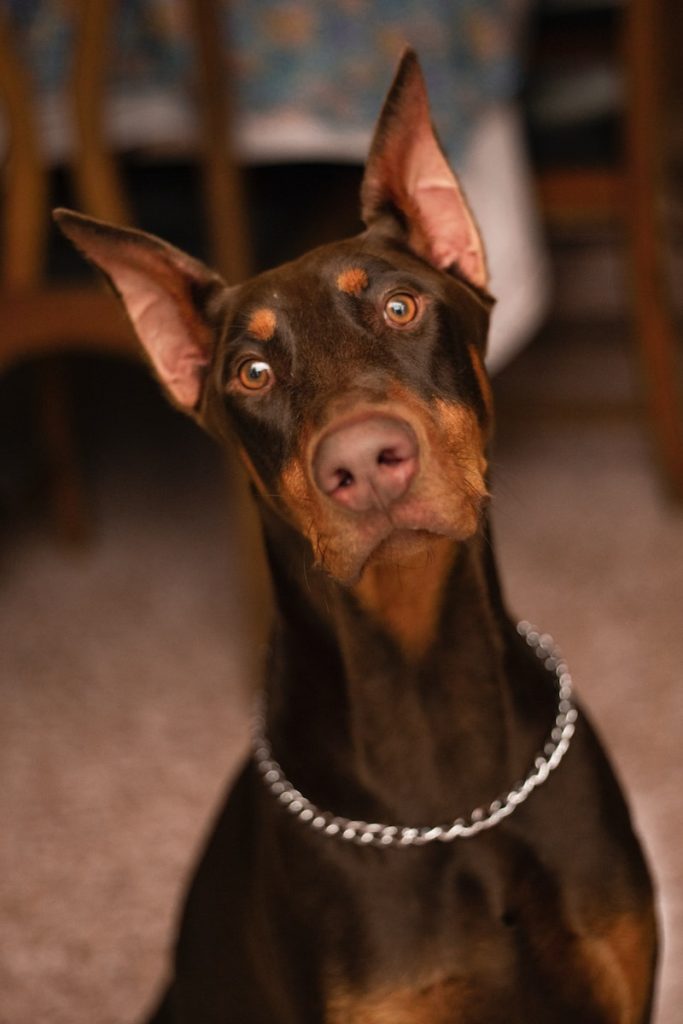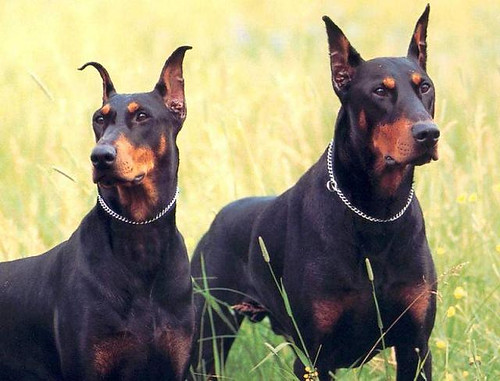The Doberman Pinscher breed is a combination of elegance, strength, speed, and endurance, which makes them the perfect working dog. This breed is highly intelligent, loyal, and protective, and their muscular and powerful build makes them an excellent choice for various working roles.
With their short, smooth, and hard coat, the Doberman Pinscher belongs to the Mastiff family and has become a popular breed for those who need a reliable, energetic, and versatile working dog.
This article aims to provide an overview of the Doberman Pinscher breed, highlighting their unique characteristics and why they make a perfect working breed. We’ll delve into the breed’s history, physical and mental attributes, and the roles they excel in as working dogs.
Whether you’re searching for an adoptable pet or are interested in learning more about this breed, this article will provide you with valuable insights into the energetic Doberman Pinscher.
Key Takeaways
- The Doberman Pinscher is a highly intelligent, loyal, and protective breed that belongs to the Mastiff family and is known for its muscular and powerful build.
- The breed is ideal for various working roles such as police and military work, search and rescue missions, and as a service dog, but requires regular exercise and mental stimulation to prevent boredom and destructive behaviors.
- Adopting a Doberman Pinscher can come with fees ranging from a few hundred to a few thousand dollars, and positive reinforcement techniques and early socialization are important for ensuring a well-behaved companion.
- The breed is prone to certain health issues such as hip dysplasia and heart problems, so working closely with a veterinarian to monitor their health and provide regular check-ups is important for their overall well-being.
Brief Overview
The Doberman Pinscher, often referred to simply as the Doberman, is a medium-to-large-sized breed originating from Germany. Bred by a tax collector Louis Dobermann in the late 19th century, the Doberman was initially intended to be a loyal and protective companion.
History of the Doberman Pinscher
The history of the Doberman Pinscher is rich and intriguing. Louis Dobermann, a tax collector in Apolda, Germany, desired a dog to accompany him on his rounds while offering protection. With this vision, he selectively bred various dogs, including the Rottweiler, Weimaraner, and German Pinscher, to develop a loyal and fearless breed.
The Doberman Pinscher was officially recognized by the American Kennel Club (AKC) in 1908 and has since gained popularity worldwide for its remarkable qualities. Today, the Doberman is valued as a versatile working dog, a dedicated family companion, and a loyal guardian.
Characteristics
The Doberman Pinscher possesses a distinct and striking appearance, with its well-muscled body, sleek coat, and alert expression. Let’s explore the key characteristics that make the Doberman a breed like no other.
Physical Appearance
-
- The Doberman Pinscher is a medium-to-large-sized dog with a strong and muscular build.
- Their short, smooth, and dense coats typically come in four recognized colors: black, red, blue, and fawn.
- Its long, tapering neck, deep chest, and well-arched toes accentuate the breed’s elegant and noble stance.
Temperament and Personality
-
- Doberman Pinschers are renowned for their loyalty, intelligence, and protectiveness.
- They form deep bonds with their human families and are known to be fiercely devoted and vigilant.
- While Dobermans are often depicted as aggressive or vicious, this is a misconception. Proper training and socialization are crucial to raising a well-behaved and balanced Doberman.
Versatility and Working Ability
-
- Doberman Pinschers excel in various fields, making them highly versatile working dogs.
- They have a remarkable aptitude for obedience training, agility, tracking, and search and rescue operations.
- Additionally, their innate protective instincts and alertness make them excellent candidates for law enforcement and personal protection roles.
Training and Socialization
Proper training and socialization are essential for a well-rounded and obedient Doberman Pinscher. From an early age, it is crucial to establish yourself as a firm but fair leader, using positive reinforcement techniques to encourage good behavior.
Training Tips
- Start Early: Begin training your Doberman puppy when you bring them home. Early training ensures a strong foundation and helps prevent behavioral issues.
- Positive Reinforcement: Use rewards such as treats, praise, and play to motivate and encourage your Doberman. This positive approach creates a bond based on trust and respect.
- Consistency: Be consistent with your commands, expectations, and routines. Dobermans thrive on consistency and respond better when they know what is expected.
- Socialization: Introduce your Doberman to various environments, people, and other animals from a young age. Proper socialization helps them develop into well-mannered and confident adults.
- Obedience Training: Enroll your Doberman in obedience classes or work with a professional trainer to ensure they learn basic commands and develop good manners.
Health Considerations
As with any breed, Doberman Pinschers are prone to certain health conditions that potential owners should know. Responsible breeders strive to minimize these risks through careful selection and health testing. Regular veterinary check-ups and a nutritious diet are crucial for your Doberman’s well-being.
Adoptable Pets
Adoptable pets of this breed can often be found in animal shelters, with an estimated 20% of dogs in shelters being purebred. If you’re interested in adopting a Doberman Pinscher, it’s important to do your research and find a reputable shelter or rescue organization to ensure the health and well-being of the dog.
Here are five things to consider when adopting a Doberman Pinscher:
- Training techniques: Because the Doberman Pinscher is a working breed, they require consistent training and socialization from a young age to prevent behavior issues. Positive reinforcement techniques and early socialization with people and other animals can help ensure a well-behaved companion.
- Health concerns: Like all breeds, Doberman Pinschers are prone to certain health issues, such as hip dysplasia and heart problems. Be sure to ask the shelter or rescue organization about the dog’s medical history and any potential health concerns before adopting.
- Exercise needs: Doberman Pinschers are highly energetic and require plenty of exercise and mental stimulation. A home with a fenced yard or access to regular outdoor exercise is ideal for this breed.
- Grooming requirements: The short, smooth coat of the Doberman Pinscher requires minimal grooming, but regular baths and nail trims are still necessary.
- Adoption fees: Adopting a Doberman Pinscher can come with fees ranging from a few hundred to a few thousand dollars, depending on the organization and the dog’s age and health status. Be sure to factor in these costs when considering adoption.
By considering these factors, you can decide whether a Doberman Pinscher is the right breed for you and give a deserving dog a loving forever home.
Common Health Issues
- Dilated Cardiomyopathy (DCM): DCM is a heart condition that affects some Dobermans. Regular cardiac screenings and a heart-healthy diet are essential for early detection and management.
- Hip Dysplasia: This condition involves the abnormal development of the hip joint, leading to discomfort and mobility issues. Responsible breeders conduct hip evaluations to reduce the incidence of hip dysplasia in their breeding lines.
- Von Willebrand’s Disease: Dobermans are predisposed to this inherited bleeding disorder. Testing can identify carriers and affected dogs, allowing responsible breeding practices to minimize the occurrence of this condition.
- Hypothyroidism: Dobermans may develop an underactive thyroid gland, resulting in weight gain, lethargy, and skin problems. Regular blood tests can detect and manage this condition effectively.
Remember, early detection and intervention are vital for addressing potential health concerns in Doberman Pinschers. Regular veterinary care, a balanced diet, and appropriate exercise are essential for maintaining their health and well-being.
Related Content
Related Content provides information and resources for individuals looking to learn more about owning and caring for a Doberman Pinscher.
One important aspect of owning this breed is providing them with ample opportunities for outdoor activities. As a working breed with high energy levels, they thrive when given the chance to run, play, and exercise in a safe and secure environment. Regular walks, runs, and playtime in a fenced yard can help keep them physically and mentally stimulated, while also preventing boredom and destructive behaviors.
In addition to providing outdoor activities, it is crucial to prioritize the health and care of your Doberman Pinscher. This breed is prone to certain health issues, such as hip dysplasia, von Willebrand’s disease, and dilated cardiomyopathy. It is important to work closely with a veterinarian to monitor their health, provide regular check-ups, and address any concerns as they arise. Proper nutrition, regular exercise, and preventative measures such as vaccinations and parasite control can also help keep your Doberman Pinscher healthy and happy for years to come.
Frequently Asked Questions
Are Doberman Pinschers good with children?
A: Yes, with proper socialization and training, Doberman Pinschers can be excellent companions for children. They are known for their protective nature and can form strong bonds with kids. However, supervision is always necessary to ensure the dog’s and child’s safety and well-being.
Do Doberman Pinschers require a lot of exercise?
A: Doberman Pinschers are an active breed that thrives on regular exercise and mental stimulation. Daily walks, playtime, and interactive activities are essential to satisfy them physically and mentally. A tired Doberman is typically a well-behaved Doberman.
Are Doberman Pinschers aggressive?
A: Contrary to popular belief, Doberman Pinschers are not inherently aggressive. They can be gentle, loving, and well-mannered companions with proper training, socialization, and responsible ownership. Aggression is often a result of poor breeding, inadequate training, or a lack of socialization.
Can Doberman Pinschers adapt to apartment living?
A: While Doberman Pinschers are active, they can adapt to apartment living with sufficient exercise and mental stimulation. However, to meet their activity needs, it is essential to ensure they receive regular exercise outside of the apartment, such as daily walks or trips to a dog park.
Are Doberman Pinschers prone to separation anxiety?
A: Doberman Pinschers are known to form strong bonds with their owners, and as such, they can be prone to separation anxiety if left alone for extended periods. Early training, gradually increasing alone time, and providing mental enrichment can help alleviate separation anxiety in Dobermans.
Can Doberman Pinschers coexist with other pets?
A: With proper socialization and introductions, Doberman Pinschers can live harmoniously with other pets. Early socialization ensures they learn to interact appropriately with other animals. However, it’s important to supervise interactions and consider individual temperaments when introducing a Doberman to other pets.
Conclusion
In conclusion, the Doberman Pinscher is a remarkable breed with a rich history, striking appearance, and exceptional qualities. Their loyalty, intelligence, and versatility make them cherished companions, working dogs, and guardians. With proper training, socialization, and care, the Dobermans can thrive in various environments and bring joy and devotion to their human families. If you’re considering adding a Doberman Pinscher, choose a reputable breeder, invest time in training and socialization, and provide them with the love and attention they deserve.
Speaking of love and attention, Bone Voyage Dog Rescue is giving love and attention to strays and unwanted dogs of Mexico and helping them find their forever home in North America that will give them the love and attention they deserve. You can reach us at +52 3329718011 or through email at [email protected] if you want to learn more ways how you can help!



